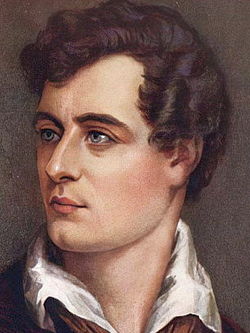
Cause of death: fever
George Gordon Byron, 6th Baron Byron, (22 January 1788 – 19 April 1824) was a British poet and peer. He is one of the major figures of the Romantic movement, and is regarded as being among the greatest of British poets. Among his best-known works are the lengthy narratives Don Juan and Childe Harold's Pilgrimage; many of his shorter lyrics in Hebrew Melodies also became popular.
Byron was educated at Trinity College, Cambridge, before he travelled extensively in Europe. He lived for seven years in Italy, in Venice, Ravenna, and Pisa after he was forced to flee England due to threats of lynching. During his stay in Italy, he would frequently visit his friend and fellow poet Percy Bysshe Shelley. Later in life, Byron joined the Greek War of Independence to fight the Ottoman Empire, for which Greeks revere him as a folk hero. He died leading a campaign in 1824, at the age of 36, from a fever contracted after the first and second sieges of Missolonghi.
His one child conceived within marriage, Ada Lovelace, was a founding figure in the field of computer programming based on her notes for Charles Babbage's Analytical Engine. Byron's extramarital children include Allegra Byron, who died in childhood, and possibly Elizabeth Medora Leigh, daughter of his half-sister Augusta Leigh.
Source : Wikipedia